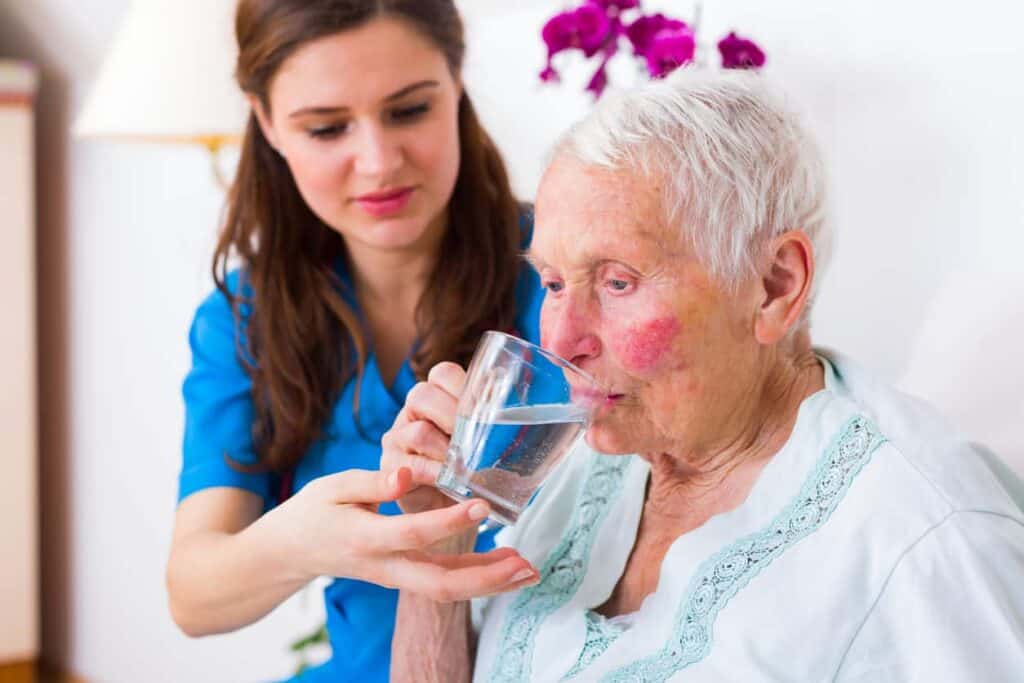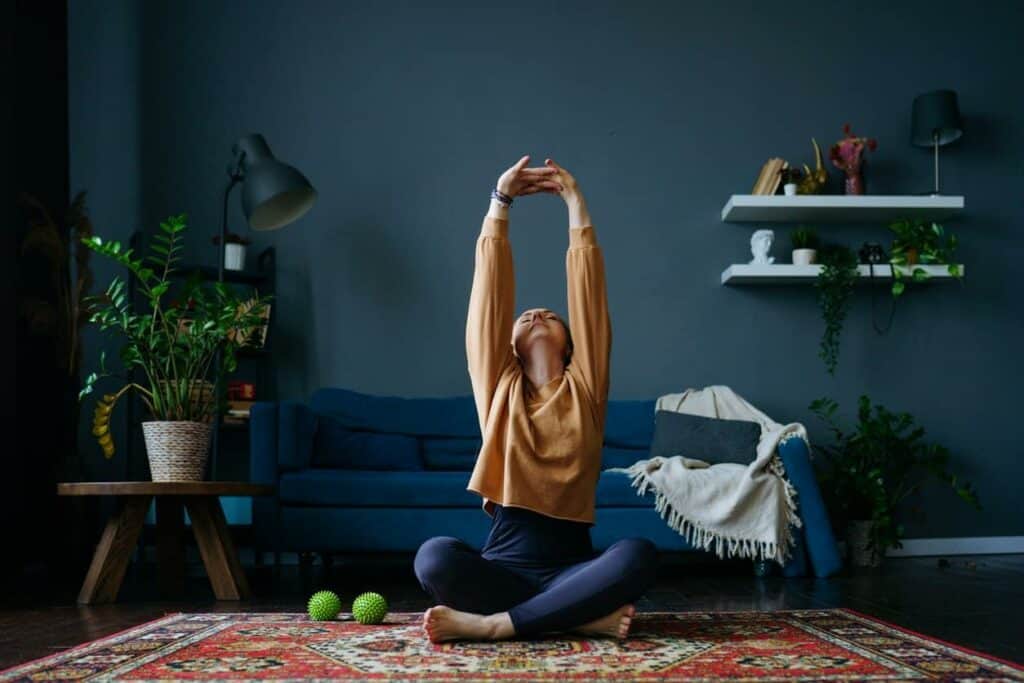
25+ Joyful Indoor Activities for Seniors That Will Transform Their Day
As seasons change in Reno and Carson City, or when mobility becomes a challenge, finding engaging indoor activities for seniors can feel like a difficult

As evening approaches, you may begin to worry. Just when you need a break, your loved one with dementia may start exhibiting behaviors that leave you clueless about what to do. They may frantically pace around, appear extremely confused, or get aggressive.
This set of behaviors that occur during the late afternoon or evening is termed “sundowning”, “sundowner’s syndrome”, or “sundown syndrome”.
What exactly is sundowning dementia, can it be treated? How can you can you and your loved one cope?
Amy’s Eden has put together this article to shed light on sundowning and to help primary dementia caregivers manage the situation better. Keep reading to learn more.
Sundowning refers to the changes in behaviors that happen around late afternoon or evening. Older adults with dementia or Alzheimer’s experience an increase in confusion, agitation, anxiety, and aggression.
Your loved one may begin to feel anxious, pace around the house as if they are looking for something, say they want to go pick up their kids from school, or claim they are in the wrong house and need to get home.
These behaviors can continue into the night, making it difficult for you and your loved one to get enough sleep, and function properly during the day.
While sundowning typically occurs during dusk, it’s not limited to dusk. It can also occur in the morning or at other times during the day.
It’s important to note that sundowning is not a disease, rather, it’s a group of symptoms that occur in people with dementia. According to the Cleveland Clinic, 1 in 5 people with Alzheimer’s will experience sundowning.

Sundowning may occur at any stage of dementia. However, it’s more common in the middle and late stages of dementia.
The exact cause for sundowning is not yet known, experts think it may be due to the progression of dementia and the changes that occur in the brain.
Learn more about dementia stages and symptoms.
Yes, sundowning without dementia can occur in older people. As we get older, our brain shrinks, and there is a general loss of brain mass. This can affect our reasoning and judgment and make us more susceptible to confusion and disorientation. These behaviors can mirror sundowning.
Sundowning symptoms may also occur in anxiety patients, those experiencing sleep disturbances, or those with Parkinson’s disease.
An episode of sundown syndrome may resolve after a few hours after evening time; it may also continue into the night. In some cases, your loved one may experience it for a few days, and not experience it for a while. In other cases, it may be consistent over several days or weeks.

When someone is experiencing sundowning, they may be:
They may exhibit behaviors such as:
They may also become paranoid, and experience hallucinations.
While the exact cause of sundowning isn’t known, certain causes or factors can trigger symptoms. They include:
Your feelings of tiredness and frustration may also cause your loved one to be upset and worsen sundowning symptoms. While it’s okay to feel that way, managing your reactions to sundowing might make a difference.

Sundowning symptoms can affect both the care receiver and the caregiver. As it typically occurs during evening hours, this can lead to sleep disruptions for both parties and affect how they function during the day.
Below are some tips to help you and your loved one cope.
Since sundowning may be triggered by disturbances in the sleep-wake-cycle, establishing a routine might help manage the symptoms. Ensure your loved one wakes around the same time every day and sleeps at a specific time. Activities during the day should also be structured, such as breakfast, lunch, dinner, and nap time.
Identifying what triggers sundowning for your loved one may be a significant step to managing the symptoms. For instance, if sundowning is triggered by low light as evening approaches, be sure to turn on warm lights in the rooms your loved one uses so they feel safe.
In some cases, it could be that their needs are unmet. Hunger, pain, and discomfort can trigger sundowning.
It could be as simple as asking them what the matter is. Try to listen to their response, and determine if you can figure out what the problem is, then take the necessary steps to resolve it.
Overstimulation from noisy environments, such as noise from the TV, too many visitors in the late evenings, or carrying out chores can worsen sundowning. Instead, keep things calm from early evening until when they sleep.

Certain foods, and when they are taken during the day may trigger symptoms. Watch your loved one’s diet to identify which foods may cause symptoms.
Excessive napping during the day, large meals, or watching TV into the evening for instance may affect sleep at night. Identify what may affect your loved one’s sleep, and try to limit or avoid those completely.
Mild senior exercises can promote happy hormones, and help combat sundowning dementia symptoms your loved one may be experiencing. Simple exercises like walking have been proven to be effective.
Music therapy has been shown to alleviate the symptoms of sundowning and Alzheimer’s such as agitation and mood swings in older adults. When incorporated into your loved one’s daily routine, it can help improve sleep patterns, and help them transition from day to night.

Personalized music is the key to the effectiveness of music therapy. You can start by trying out relaxing music, or music your loved one enjoys to see if it works. If you’re unsure, or the former approaches are not successful, consult a music therapist. A quick search for “music therapist near me” can help you find one.
Since sundowning symptoms may be caused by sleep-wake patterns and reduced light as dusk approaches, experts believe practicing bright light therapy may help reduce symptoms.
Studies show that using light therapy may help balance the circadian rhythm and improve sleep disturbances, agitated behavior, and depression.
How do you implement bright light therapy?
Using light therapy once will not have any drastic change in sundowning symptoms, it has to be used consistently and in a routine. Keep in mind that everyone may react differently, and it may or may not work for your loved one. Be sure to consult with your loved one’s physician before implementing this therapy, especially with fluorescent lamps or bulbs.
If medication side effects could be triggering symptoms, consult with your loved one’s doctors to find out the best times to take medications to reduce or eliminate any side effects that may contribute to sundowning.
Additionally, their physician may recommend other treatment plans if behavioral and environmental changes have proven ineffective.

In some cases, sundowning symptoms can be treated or minimized with medications. Medications for sundowning treatment include:
Your loved one’s physician will determine when medications should be used, and how they should be used.
Your reaction to sundowning may exacerbate or improve the symptoms. Here are some tips to remember.

Caring for someone with sundowning can be challenging. It’s essential to prioritize both your well-being and the well-being of the person you are caring for. Here are some tips to help you care for yourself while caring for someone with sundowning:
Sundowning, a change in behaviors that occurs in late afternoons or evenings can be a handful to manage. Your loved one may be agitated, anxious, restless, and suspicious. As these symptoms can occur into the night, they might impact your sleep and that of your loved one as well.
Coping with sundowning can be challenging, but establishing a routine, identifying triggers, reacting calmly, and implementing most of the tips discussed above can minimize symptoms.
Regardless, sometimes you still need a break, and an extra pair of hands to provide care while you recharge, take care of your family, or pursue other interests.
In that case, compassionate and trained caregivers from Amy’s Eden can come to the rescue. Whether you want our caregivers to come to your loved one’s home to provide care, or your loved one should transition into one of our assisted homes, we have got you covered.
Contact us today, and learn more about how we can provide compassionate care to minimize sundowing symptoms and help your loved one thrive.
https://my.clevelandclinic.org/health/articles/22840-sundown-syndrome
https://www.medicalnewstoday.com/articles/what-stage-of-dementia-is-sundowning
https://www.webmd.com/alzheimers/manage-sundowning
https://www.dementiauk.org/information-and-support/health-advice/sundowning/
https://www.alzheimers.org.uk/about-dementia/symptoms-and-diagnosis/symptoms/sundowning
Get care >

As seasons change in Reno and Carson City, or when mobility becomes a challenge, finding engaging indoor activities for seniors can feel like a difficult
Family Survey Please share your honest feedback to help us improve the care and safety of your loved one.
Professional Senior In-Home Care in Carson City Keep your loved one in the comfort of their cherished home. Amy’s Eden delivers exceptional senior care services

The Best Home Care in Reno, NV The comfort of your home, the quality of Eden. We provide compassionate, professional in-home care services for seniors

Amy's Eden Senior Care © 2023